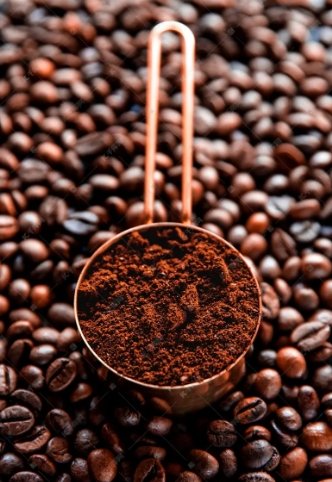You’ve brewed a cup of coffee from a new bag of specialty beans, full of anticipation, only to be met with a taste that’s disappointingly sour or overwhelmingly bitter. What went wrong? More often than not, the culprit isn’t the bean or your brew method—it’s your grind size.
Welcome to your definitive, visual guide to mastering the coffee grind. Think of grind size as the primary control knob for your coffee’s flavor. Understanding it takes the guesswork out of brewing and empowers you to consistently produce delicious coffee. While we covered the basics in our Ultimate Guide to Coffee Grinders, this article is your deep dive into the practical art of “dialing in.”
Let’s get grinding.
1. Why Coffee Grind Size is the Master Variable of Flavor
Before we look at the chart, it’s crucial to understand why grind size has such a dramatic impact. It all comes down to one word: extraction.
Extraction is the process of water dissolving flavors from coffee grounds. The size of those grounds determines how fast this happens. Think of dissolving sugar in water: fine sugar dissolves almost instantly, while a solid sugar cube takes much longer. Coffee is the same.
- Under-extraction: This happens when your grind is too coarse. Water flows through the grounds too quickly, without enough time to extract the desirable sweet and complex flavors. The result is a coffee that tastes sour, thin, or weak.
- Over-extraction: This happens when your grind is too fine. Water is in contact with the coffee for too long, pulling out not just the good flavors, but also the undesirable, bitter, and astringent compounds. The result is a coffee that tastes bitter, harsh, or hollow.
Your goal is to find the “sweet spot” of balanced extraction, and your coffee grinder is the tool you’ll use to navigate there.
2. The Visual Coffee Grind Size Chart
Use this chart as your starting point. Remember that every coffee grinder is different, so use the “Visual Appearance” and “Feel” columns as your primary guide, rather than the specific number on your grinder’s dial.
| Brew Method | Grind Size Name | Visual Appearance | Feel | Starting Point Rationale |
| Turkish Coffee | Extra Fine | Powder, like flour | Powdery, clumps together | Near-instant extraction in boiling water. |
| Espresso | Fine | Finer than table salt | Soft and sand-like, but finer | High pressure requires high resistance for a 20-30s shot. |
| Pour Over (V60, etc.) | Medium-Fine | Like table salt | Gritty, like regular sand | Balances extraction time (2-4 min) and water flow. |
| AeroPress | Medium-Fine to Medium | From table salt to coarse sand | Gritty | Highly versatile; finer for short brews, coarser for longer brews. |
| Drip Coffee Maker | Medium | Like coarse sand | Distinctly gritty | Standard for automated machines with medium brew cycles. |
| (Prensa francesa) | Coarse | Like coarse sea salt | Chunky, small pebbles | Long immersion (4+ min) requires low surface area to prevent over-extraction. |
| Cold Brew | Extra Coarse | Like cracked peppercorns | Very chunky, like breadcrumbs | Extremely long steeping time (12-24 hours) demands the lowest extraction rate. |
3. How to “Dial In” Your Grind for Perfect Taste
The chart above gives you the ballpark; now it’s time to fine-tune based on taste. This process is called “dialing in,” and it’s simpler than it sounds.
The Golden Rule: Taste and Adjust
Your tongue is the ultimate judge. Brew a cup using the recommended starting point from our coffee grind size chart. Taste it carefully. Then, follow this simple troubleshooting loop:
- If your coffee tastes SOUR, WEAK, or LACKING SWEETNESS:
- Problem: It’s likely under-extracted.
- Action: Adjust your coffee grinder one or two steps FINER. This increases surface area and slows down water flow, increasing extraction.
- If your coffee tastes BITTER, HARSH, or ASTRINGENT (drying sensation):
- Problem: It’s likely over-extracted.
- Action: Adjust your coffee grinder one or two steps COARSER. This decreases surface area and speeds up water flow, reducing extraction.
A Note on Different Beans
Remember that different coffees may require different grind settings. A light-roast, dense Ethiopian bean might need a finer grind than a dark-roast, porous Sumatran bean, even for the same brew method. Always be prepared to adjust for each new bag of coffee.
4. A Deeper Look at Each Grind Size
Let’s break down the main categories to give you a clearer picture.
Fine Grind (For Espresso & Moka Pot)
This is the realm of high-pressure or high-resistance brewing. The espresso coffee grind size needs to be fine enough to create a dense “puck” of coffee that water has to force its way through in about 25-30 seconds. It’s much finer than what you’d use for any filter coffee.
Medium Grind (For Drip & Pour Over)
This is the most common range for home brewers. The grind size for pour over is a perfect example of a medium-fine setting, balancing clarity and sweetness. A slightly coarser medium grind is standard for automatic drip machines. This range is forgiving and produces a clean, balanced cup.
Coarse Grind (For French Press & Cold Brew)
When you steep coffee grounds directly in water for a long time, you need a coarse grind coffee. The large particle size slows extraction way down, preventing a bitter mess. For a French press grind size, the coarseness also helps the metal filter do its job without getting clogged. For Cold Brew, the grind is even coarser to accommodate the extremely long steeping time.
5. Conclusion: Your Control Over Flavor
Understanding and manipulating grind size is the single most powerful skill you can develop as a home brewer. It transforms you from a passive participant into the active director of your coffee’s flavor. Use our coffee grind size chart as your map, use your palate as your compass, and don’t be afraid to experiment. The perfect cup is not a fixed destination—it’s a delicious journey of discovery.
Ready to find the perfect tool for the job? Mastering the grind is a huge step. If you’re ready to find the perfect
coffee grinderto put this knowledge into practice, explore our top recommendations in our master guide.➡️ Return to The Ultimate Guide to Coffee Grinders
Te invitamos a suscribirte a nuestro canal de YouTube
https://www.youtube.com/channel/UChoV1BYSsG476ubjjpu2LsQ
¡Obtén las últimas novedades y descuentos: síguenos en Facebook!
https://www.facebook.com/profile.php?id=61573369014606


